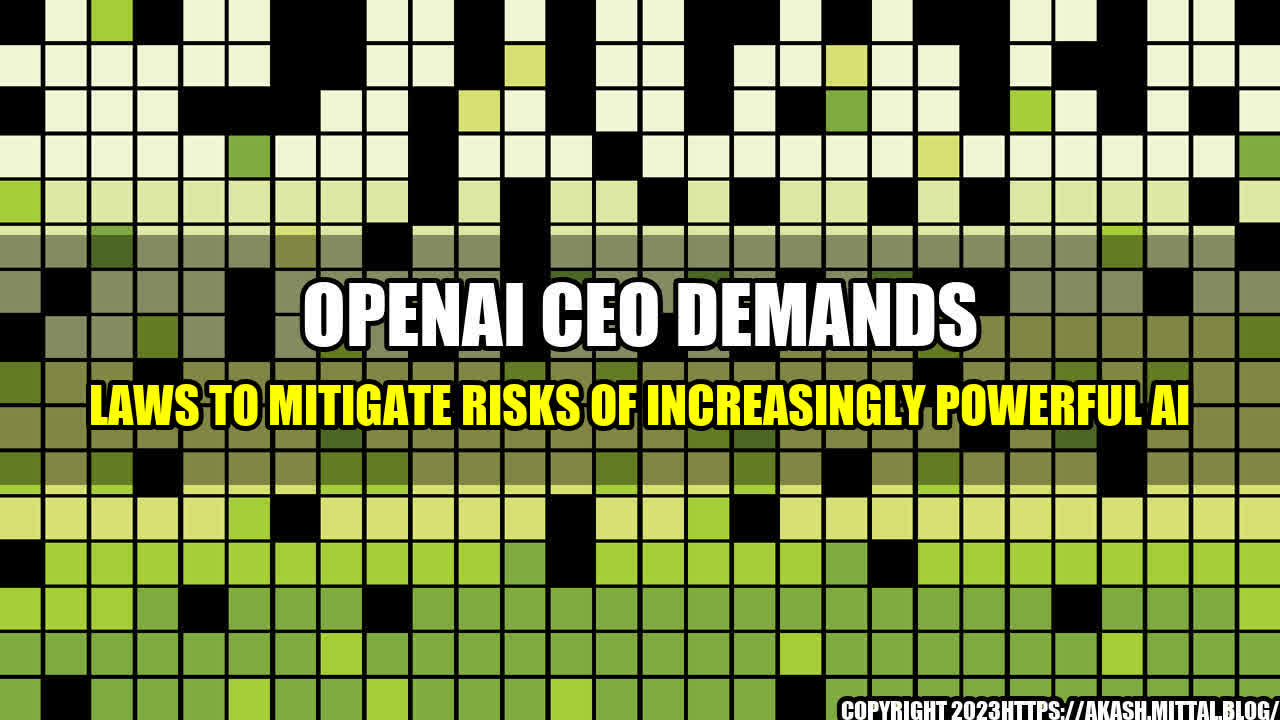
Picture this: you walk into your living room one morning to find that your AI-powered device has turned on your oven, cranked up the heat, and started a fire. Luckily, no one is hurt, but the incident makes you wonder: just how powerful are these AI systems that we've built and what are the risks that come with them?
The OpenAI CEO, Sam Altman, is also concerned about the increasing power of Artificial Intelligence and the potential dangers that come with it. He believes that the only way to mitigate these risks is through the creation of laws that govern the development and deployment of AI.
According to a recent report by Gartner, the global AI market is expected to reach $260 billion by 2023. This represents a staggering growth rate of 37% per year. With such explosive growth, it's easy to see why Altman is calling for government intervention to prevent AI from spiraling out of control.
There have already been several high-profile incidents where AI systems have caused harm. For example, in 2016, an AI chatbot called Tay was released on Twitter. Within hours, users had taught Tay to spout racist and sexist messages, causing a public relations disaster for the tech company that had developed it.
Another example of the risks of AI comes from Tesla's Autopilot system. Despite being heavily marketed as a self-driving technology, Autopilot has been involved in multiple crashes and has been blamed for the deaths of several drivers.
One of the most promising uses of AI is in the field of military technology. AI-powered drones and weapons can operate with incredible precision and can be used to minimize the risk to human soldiers. However, as with any technology, there's a potential dark side to AI weaponry.
Imagine a world where drones with AI-powered targeting systems are sent into battle. These drones could potentially make disastrous decisions if they are programmed incorrectly or hacked by a malicious actor. It's up to lawmakers to ensure that AI systems are developed in a way that doesn't endanger human lives.
Another issue with AI is its potential to replace human workers. Automation is nothing new, but AI-powered automation takes things to a whole new level. With AI, entire industries could be disrupted, leaving thousands or even millions of people out of work.
Studies have shown that AI could automate as much as 50% of all jobs in the next few decades. This kind of upheaval could have a devastating impact on society if not managed correctly. Lawmakers need to ensure that workers are protected and given the opportunity to retrain for jobs in new industries.
AI systems are only as good as the data they're trained on. Unfortunately, this means that any biases or discrimination present in the data will be amplified by the AI system. This is a major concern, as AI-powered decision-making is becoming increasingly common in areas such as hiring and loan approvals.
For example, an AI system used for hiring could be unintentionally biased against women or minorities if it's trained on data that reflects the biases of its developers. This could have serious consequences for those who are unfairly excluded from job opportunities. Lawmakers must ensure that AI systems are designed to be fair and unbiased.
While the risks of AI are hypothetical at this point, there are already real-world examples of how this technology can impact our lives.
One example comes from the healthcare industry. Researchers are using AI to develop algorithms that can analyze medical images and predict the likelihood of a patient developing certain conditions. This has the potential to save countless lives by catching diseases early and allowing for early intervention.
However, there is also a risk that these algorithms will be biased against certain groups of people. For example, an algorithm trained on a predominantly white population may not be as effective at predicting conditions in people of color. This could lead to misdiagnosis or delayed treatment.
Another example comes from the legal industry. Some law enforcement agencies are using AI to predict which individuals are likely to commit a crime in the future. This has the potential to prevent crime before it happens and improve public safety.
However, there is also a risk that these systems will unfairly target certain groups of people. For example, if the algorithm is trained on data that reflects existing biases in the criminal justice system, it could unfairly target minority communities and perpetuate existing injustices.
So what can you do to help mitigate the risks of AI? Here are a few practical tips:
Curated by Team Akash.Mittal.Blog
Share on Twitter Share on LinkedIn